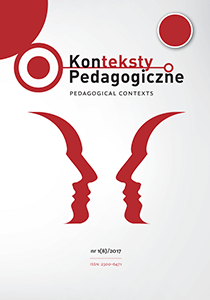Abstract
The aim of this article is to describe the impact of music classes on psychomotor development of children, and the way different teaching methods affect the child’s musical, physical and psychological development and primar-ily – the development of speech. The process of learning to speak is in fact analo-gous to learning of music. The contact with music even from the prenatal period has a huge impact on the maturation and supports child’s progress at each step of growing up. Through music, we can very early aid and stimulate the senses of children, and thus develop their innate talents. The variety of methods opens up the world of music and allows the child to develop faster and richer.
References
Bonna, B. (2005). Rodzina i przedszkole w kształtowaniu umiejętności muzycznych dzieci. Zastosowanie koncepcji Edwina E. Gordona. Bydgoszcz: Wydawnictwo Uniwersytetu Kazimierza Wielkiego.
Burzak, O. (2010). Rozwój muzyczny dziecka. Twoja Muza,nr 1.
Cukierówna, W., Wieman, M. (1965). Zajęcia umuzykalniające w przedszkolu. War-szawa: PZWS.
Gawryłkiewicz, J., Gawryłkiewicz,M. (2010) (red.). Podręcznik do kierowania edukacją muzyczną małego dziecka według teorii uczenia się muzyki Edwina E. Gordona. Kraków: Impuls.
Gordon, E.E. (1997). Umuzykalnienie niemowląt i małych dzieci. Teoria i wskazówki praktyczne, przeł. E. Kuchtowa, A. Zielińska. Kraków: Wydawnictwo Zamiast Ko-repetycji.
Gordon, E.E. (1999). Sekwencje uczenia się w muzyce. Umiejętności, zawartość, motywy, przeł. A. Zielińska-Croom, E. Klimas-Kuchtowa. Bydgoszcz: Wydawnictwo WSP.Kamińska, B., Kotarska, H. (2008). Średnia miara słuchu muzycznego. Warszawa: Wy-dawnictwo UMFC.
Królak, M. (2008). Rozwój prenatalny a mowa dziecka. Przyjaciel, 3(10).
Michalski, A. (2002) (red.). Nowe koncepcje edukacji muzycznej; edukacja muzyczna teorii Gordona.Bydgoszcz: Wydawnictwo Akademii Bydgoskiej im. Kazimierza Wielkiego.
Pazur, B. (2005). Audiacja w szkole i podczas zbiorowej nauki gry na instrumentach. Twoja Muza, nr 3.
Pazur, B. (2008). Kierowanie rozwojem zdolności audiacyjnych dzieci w wieku przedszkolnym poprzez zajęcia umuzykalniające metodą E.E. Gordona.Lublin: Wydawnictwo UMCS.
Sosińska, T. (1987). Muzyka wyzwala różne formy ekspresji. Wychowanie Przedszkolne, 9.
Stankowska, K. (2008). Znaczenie zajęć umuzykalniających dla rozwoju dziecka. Nasz Czas, 9.
Wolińska, E. (2012). Możliwości rozwijania dzieci przez zajęcia muzyczne na przykładzie metody Edwina E. Gordona. Praca magisterska napisana pod kierunkiem dr hab. Agnieszki Weiner. Lublin: UMCS.
Zwolińska, E. (1997). Rozwój wyobraźni muzycznej, a funkcje percepcyjnomotoryczne w młodszym wieku szkolnym. Bydgoszcz: Wydawnictwo WSP.
Zwolińska,E. (2000) (red.). Podstawy teorii uczenia się muzyki według Edwina E. Gordona. Bydgoszcz: Wydawnictwo WSP.
Zwolińska, E., Gawryłkiewicz, M. (2004). Podstawa programowa nauczania muzyki wg teorii uczenia się muzyki E.E. Gordona. Bydgoszcz: Wydawnictwo Kreska.
Zwolińska, E., Jankowski, W. (1995). Teoria uczenia się muzyki według Edwina E. Gordona. Bydgoszcz–Warszawa: Wydawnictwo WSP AMFC.
In accordance with the recommendation of the Ministry of Science and Higher Education, which aims to counteract the practice of “ghostwriting” and “guest authorship,” all authors submitting their text for publication should attach an author’s statement which declares the contribution of each of the authors to the article. The printed and signed statement should be delivered by mail or other means to editor-in-chief Joanna Skibska or sent in the form of a scan to the following e-mail address: redakcja@kontekstypedagogczne.pl. The authors will not receive remuneration for publishing their papers. The editors reserve the right to make minor editorial changes to the articles which will not affect the substance of the article. We encourage all authors to prepare their articles in accordance with the guidelines for manuscript preparation. Download pdf file.
Authors transfer all copyrights and grant the journal the right of first publication with the work simultaneously licensed under a Creative Commons Attribution License that allows others to share the work with acknowledgement of the work's authorship and initial publication in this journal. All authors agree to the publishing of their email addresses, affiliations and short bio statements with their articles during the submission process.

